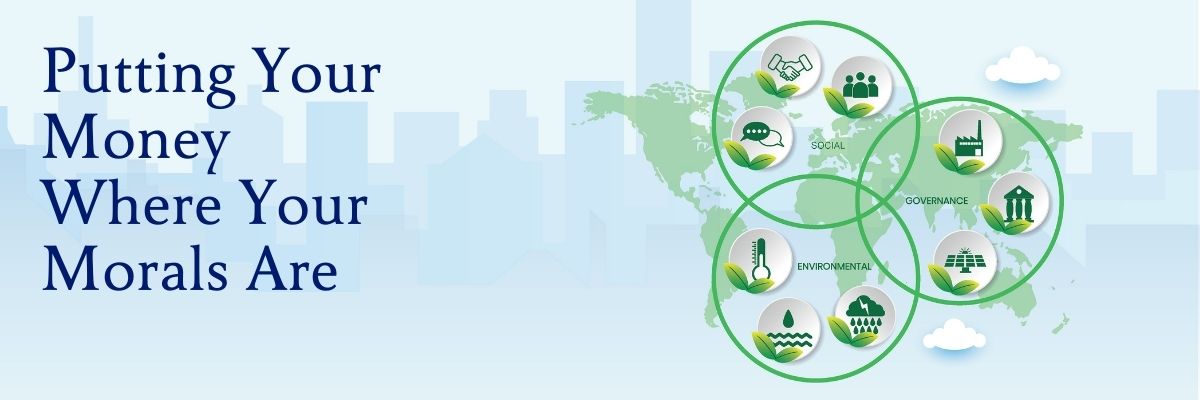Putting Your Money Where Your Morals Are

No one can accuse the financial services industry of being shy when it comes to using jargon or acronyms, especially in the sphere of investing ethically.
You may have come across such terms as ESG stocks, SRI and Impact Investment. They are all concerned with the same idea: creating positive change by thoughtfully and intentionally investing your money and they come under the umbrella term of Ethical Investment.
Ethical Investment can be defined as the practice of looking beyond the usual measures of risk and return and selecting investments on ethical or moral principles. Of course ethical values are largely subjective – what is of a moral concern to you may not be to someone else. That being said, there are certain issues which affect all of society which makes it possible to group ethical investments under common categories of focus, be that environmental concerns, animal rights, the arms industry, tobacco or gambling.
There are basically two techniques to selecting ethical portfolios. The first one is known as ‘negative screening’. This, as the name suggests, involves screening a company’s practices and products or services before deciding to invest in it. This approach seeks to avoid harm. The second technique is ‘positive investing.’ Here, an investor seeks out companies whose practices they approve of.
Although Ethical Investment has gained massive traction in recent years the roots go all the way back to religious groups of the 18th century, particularly the Quakers and the Methodists. In the USA in the 1970s, the world’s first retail ethical investment fund was created by investors who didn’t want to support companies that were profiteering from the Vietnam War – namely companies manufacturing Napalm. The UK got its first ethical fund in 1984 – the Friends’ Provident Stewardship Fund (FPSF) which excluded tobacco, arms, alcohol and oppressive regimes.
Ethical Investment tends to reflect the political climate and social concerns of the time. Currently investing continues to primarily focus on impacts on the environment and society.
There are a number of misconceptions and concerns which persist around Ethical Investment:
- It underperforms
This claim is tenuous. In fact, while no investment is guaranteed, there has been a recent trend of outperformance from ethically conscious companies. - It is more risky
This is simply not the case. There is some indication that ethical funds may offer lower levels of market risk than traditional funds. - It is more pricey
While we may expect to pay more for organic vegetables or Fairtrade goods, it is not the same when it comes to investing. The average retail ethical investment fund is priced the same or even more competitively than a comparable traditional active strategy. - It is too niche
Although Ethical Investing is still relatively small, it is growing rapidly. Now 20% of professionally managed assets in the USA have a Sustainable & Responsible Investment (SRI) mandate and this increases to 40% when we look at Europe. The UK is the second largest SRI investor in Europe. - It doesn’t make any difference
There are lots of examples of shareholder advocacy being used positively, ie shareholders using their voting rights to bring about corporate change. - It is too complicated
There is some substance to this concern. It takes considerable effort to look behind the scenes of ethical investments to make sure they align with your aims. This can prove tricky for the DIY investor and we recommend you take professional advice.
At GWA Wealth Management, in conjunction with Parmenion, we offer 40 ethical, multi-asset portfolios. These are subdivided into four ethical profiles graded A to D according to different ethical aims and preferences and there are 10 risk grades within each group. That means that we have a diverse range of portfolios and something that suits nearly everyone’s ethical preference and attitude to risk. They are also available in a variety of tax wrappers in order to fit seamlessly into your financial plan. These portfolios have demonstrably performed well since their inception in March 2012.
In conclusion, Ethical Investing is not niche: it is mainstream, it is expanding at an exponential rate and it is here to stay. Ignore the myths: there is little indication of underperformance or greater financial risk and shareholder advocacy can make a difference. What this means for the investor is that it is now possible to achieve returns without compromising your ethical principles.
If this is something you are interested in then GWA can help you, please don’t hesitate to get in touch at wealth@gwayre.co.uk or simply give us a call.


